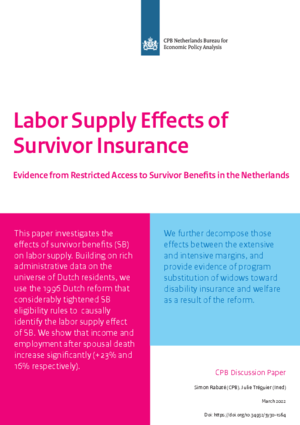Labor Supply Effects of Survivor Insurance: Evidence from Restricted Access to Survivor Benefits in the Netherlands
In this Discussion Paper, we evaluate the effect of changes in (public) survivor insurance on surviving spouses’ labor supply. We use a natural experiment to estimate the effect: the cut in eligibility for first pillar survivor insurance benefits on the labor supply of widowers, implemented in 1996.
The reform considerably reduced eligibility to survivor benefits for individuals born after January 1st, 1950. This provides a clean quasi-experimental setting as it induced a large and discontinuous drop in survivor benefits for adjacent birth cohorts. Using a regression discontinuity approach and high quality administrative data on the full universe of Dutch widows, we estimate the causal effect of survivors benefits on female income and labor force participation, as well as substitution towards other forms of social insurance.
Authors

